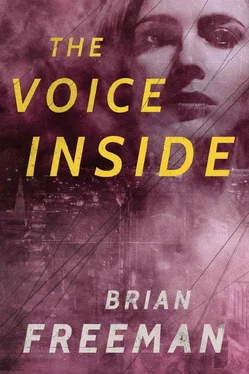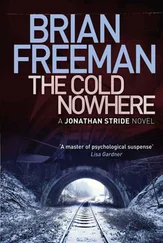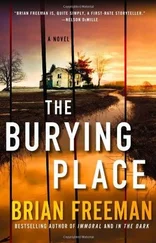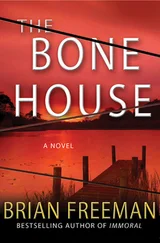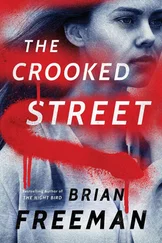“Why on earth would you do that to yourself?”
“Because I needed to cry over and over, constantly, for days, without stopping. So that’s what I did. And because I felt as unwanted as those animals.”
Frost didn’t know what to say. It was horrifying to imagine what the brothers had done to her, but almost more horrifying to think about the emotional suffering she was willing to inflict on herself. Eden projected an aura of dormant calm, but he felt as if he were staring into a volcano at a churning, melting river of lava. All these years, because of Katie, he’d thought of himself as a crime victim. But talking to Eden, he realized that he’d never had a clue what being a victim was really like. What she’d gone through was never over; it simply reemerged in her life in different forms like a nightmarish shape-shifter.
“Do you hate the brothers for what they did to you?” he asked.
“No, they’re too pathetic to waste an important emotion like hatred on them. And the irony is that they gave me my life. For all the savagery they inflicted on me, I’m where I am today because of those vicious little boys.”
“That’s true of me and Rudy Cutter, too. He’s why I’m a cop.”
“And do you hate him for what he did?” Eden asked.
“Yes, I do.”
Eden nodded, but she didn’t say anything. He wondered if she thought he was wrong to feel that way. Or maybe she was lying to cover up how much hatred she felt herself.
“How did you wind up in the US originally?” Frost asked, changing the subject and trying to pull her away from the worst of her past.
“We moved here when I was a teenager. My mom was American. A teacher from South Carolina. She met my dad on an ecotourism trip in Costa Rica. They got married and lived in Melbourne for twenty years, but eventually, we moved to New York when Dad got a job offer with one of the global finance partnerships. My brother was already studying journalism at Columbia, so it made sense.”
“Is your mom still alive?”
“No, it’s just me. Mom died not long after we came to the States. Then we lost my brother in Afghanistan. And now my dad. I’m an orphan.”
“Sorry.”
Eden turned away from him and pointed at three boxes stacked beside the condo door. He got the message; she didn’t want to talk about herself anymore. “Those are copies of my notes. The draft manuscript, too, at least as far as I’ve taken it. You can bring everything with you. I hope it helps.”
“I appreciate your sharing it with me.”
“It’s not free, you know. I have a price. I want to be part of your investigation.”
“Embedded?” Frost said.
“That’s right.”
“Do you want to move in with me and Shack?” he joked.
“Say yes, and I will.” She wasn’t joking.
“Jess thinks it’s a bad idea to let you get too close to me.”
“Maybe she’s right. I won’t stop until I know everything about you.”
“Really?”
“Really. Let’s start with Jess. Are you sleeping with her?”
The question came out of nowhere, and it set him on his heels. “No.”
“That’s not what I hear.”
He should have lied, but he was tired of lying about it. “Okay, yes, we had a brief affair. It’s been over for a long time.”
“Interesting. She’s rough-and-tumble. You’re polished. She’s older, too. And she was married, right?”
“She was separated when it happened.”
“You don’t have to apologize for it.”
“I’m not apologizing,” Frost said.
“I know what Jess says about being willing to cross ‘the line.’ Several cops told me about it. Was she wrong to do what she did with the watch?”
“Cutter’s back on the streets now, so yes.”
“What if no one had found out? Would it still be wrong?”
“Yes.”
“Would you have done the same thing?”
“No.”
“Even if it meant more women dying?”
“Yes.”
Eden pursed her lips, as if she were impressed with him. “Personally, I think Jess made the right call. We all cross lines. Sometimes you have to be willing to go too far to get the story. That’s what my brother always said.”
“When cops do it, we break laws.”
“So you really are a Boy Scout.”
“I guess so,” Frost replied.
She grinned with satisfaction, as if they’d gone through a round of foreplay. She had half a glass of wine left, but she finished it in a single swallow. Her curls shook as she tossed her head. “Well, that was fun.”
“Is that what that was?”
“It was fun for me. Do you want to talk some more? Or would you like to do something else?”
“I have to go.”
“Right. Duty calls. I’ll get someone to bring the boxes to your car.”
Frost wandered over to the boxes that were stacked by the door. He tipped up the lid of the topmost box. Inside, he saw a stack of neatly printed manuscript pages. This was her story of the Golden Gate Murders. He read the words on the title page.
“ The Voice Inside ,” he said aloud. He could hear Katie’s voice inside his head, saying those same words when she was a child. “Why did you choose that as a title?”
“It’s from a poem by Shel Silverstein. But I suspect you already know that, Frost.”
“Yes, I do. Katie loved that poem as a kid. She’d recite it all the time. She had it framed over her bed for years.”
“I know. I saw it on the bedroom wall when I met your parents. It’s the kind of quirky little detail I look for.”
“That doesn’t answer my question,” Frost said. “Why use it in your book?”
“You know the poem. It’s about listening to the voice inside to decide what’s right and what’s wrong. No one else can decide for you. It seems to me that everyone in this case has had to decide at some point in their lives whether to listen to the voice inside. Hope. Cutter. Even Jess.”
“And now me?” Frost asked.
“That’s right. And now you, too. You had to decide on the bridge whether you were going to destroy that watch. I don’t think that will be the last time you have to make a choice like that, Frost. You’re not done.”
Four years in San Quentin had given Rudy Cutter eyes in the back of his head. After a while, you could feel when someone was stalking you, and that was what kept you alive. He relied on that intuition now to make sure that no one was watching him, because the police and media had plastered his face everywhere.
He walked north on Stockton toward the tunnel that carved its way under Bush Street. He wore a dirty black hoodie, wraparound sunglasses, and jeans. He hadn’t shaved since he was released, and his beard was filling in like a wire brush. A backpack was slung over one shoulder. The crowded sidewalk made him wary, but no one looked at anyone else here. This was a melting pot where city neighborhoods converged. Upscale shops and hotels bled out of Union Square. Lawyers from the Financial Center squeezed into dim sum restaurants in Chinatown. Vape shops and massage parlors marked the fringe of the Tenderloin.
He stopped at a taqueria for lunch, but he took his order to go and ate it in the shadows of the Bush Street tunnel, where he could watch people come and go from the building across the street. White men in suits visited the Asian sauna. A homeless man with greasy hair limped past the liquor store and stuck his hand out at the customers. Two fifty-something women floated from the nail salon, caught up in their own world as if the people around them didn’t exist. Buses came and went, sucking up and belching out a dozen people at a time.
He waited an hour.
No cops. It was safe to go inside.
Rudy crossed the street to an eight-story apartment building. Fire escapes dangled over his head. He buzzed the number of an apartment on the fifth floor and pushed through the entrance door when it clicked open. He took the stairs rather than the elevator to avoid being seen. He found the number he was looking for and drummed his knuckles on the apartment door. As he waited, he listened to the empty hallway, but all he heard was the noise of the television inside.
Читать дальше
